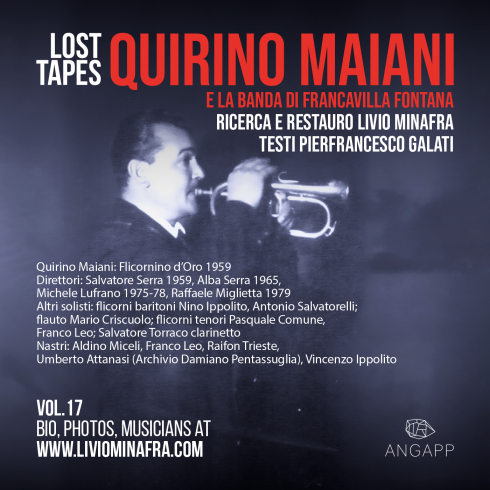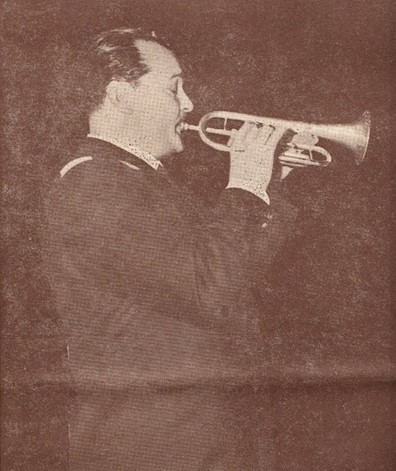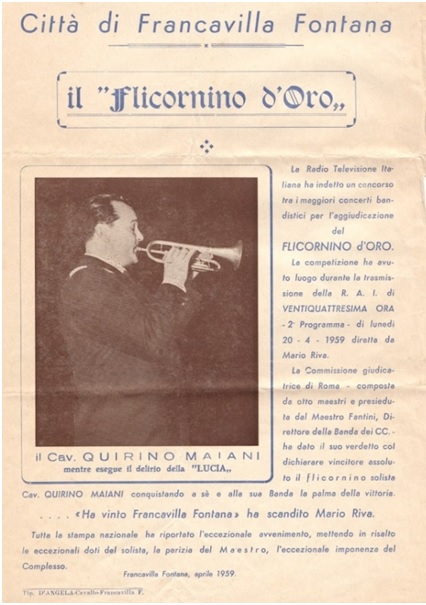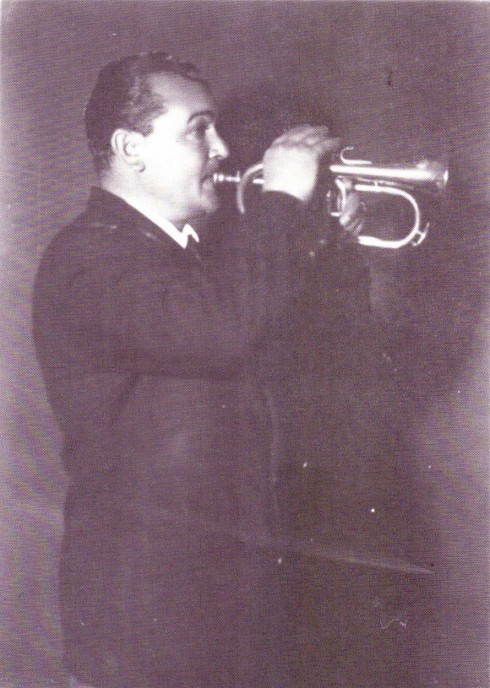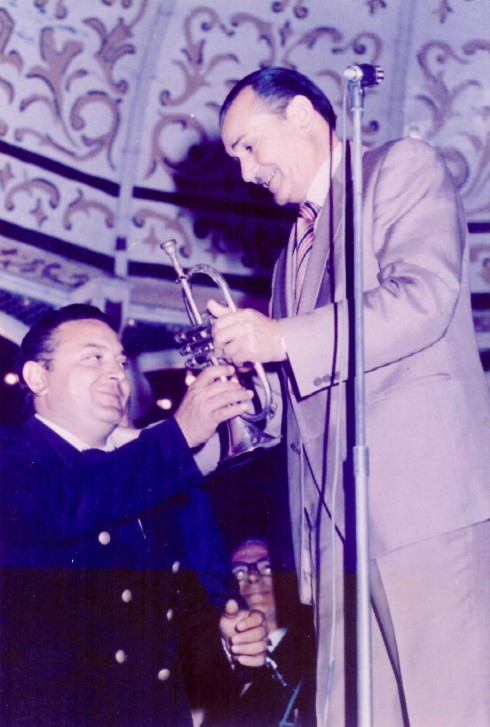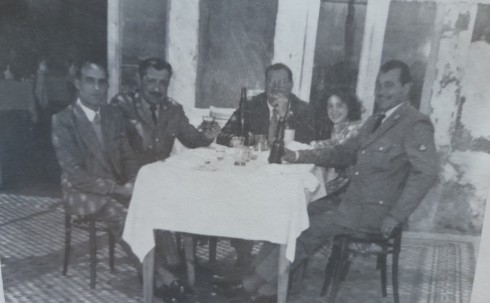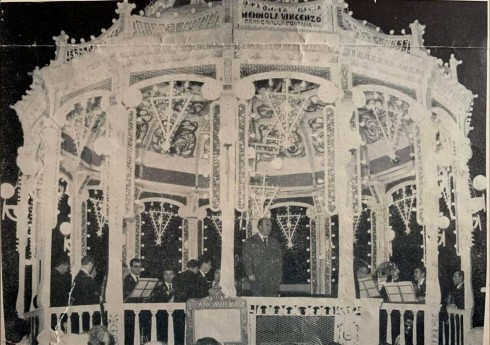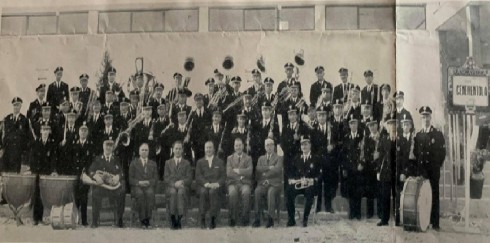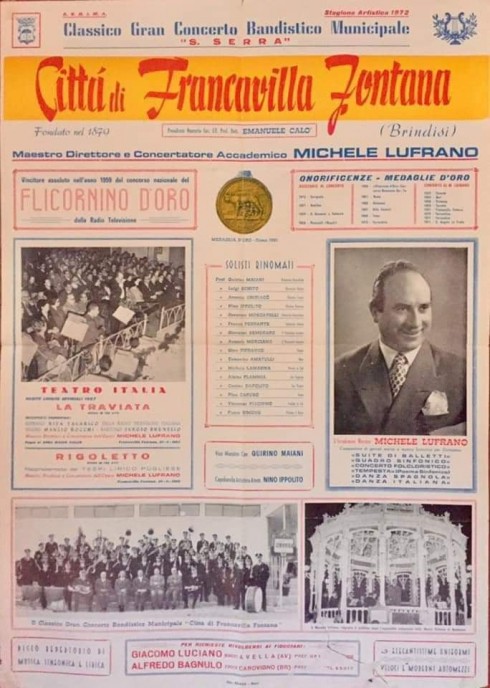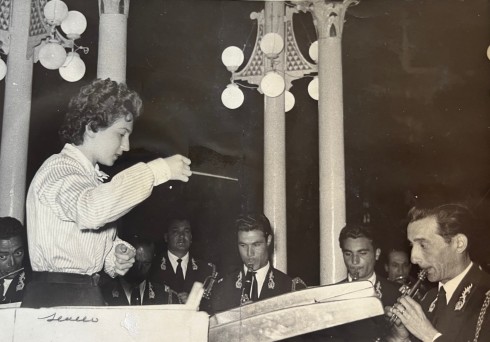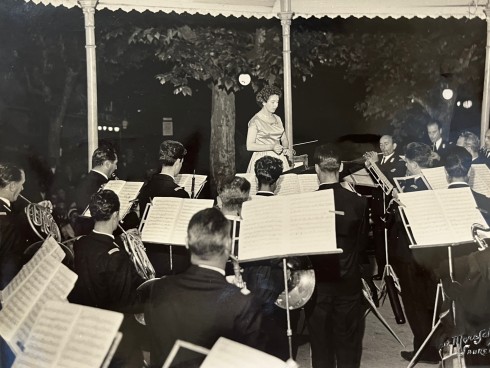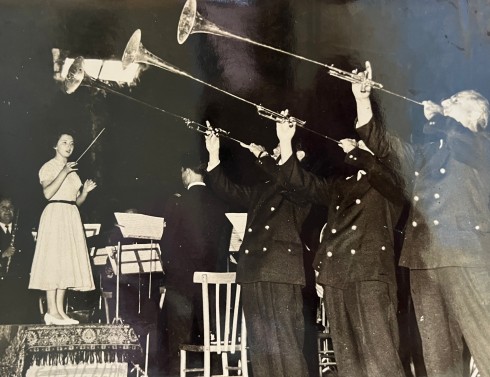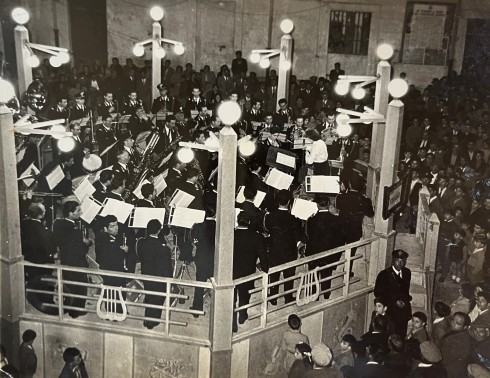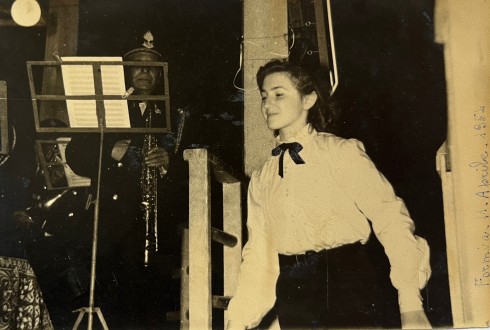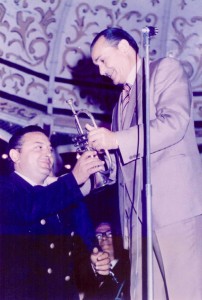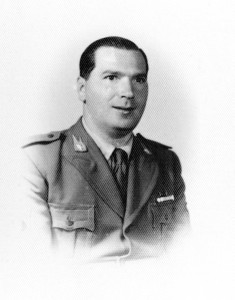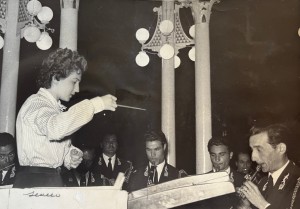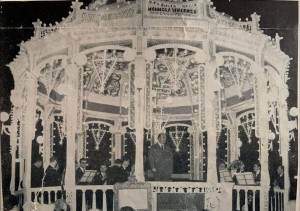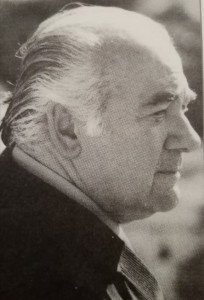Title: Lost Tapes Vol. 17 Quirino Maiani e la Banda di Francavilla Fontana
Group: Banda Città di Francavilla Fontana
Year: 1959-1979 © 2023
Graphic: 3Heads Agency
Text: Pierfrancesco Galati
Recorder: Aldino Miceli, Franco Leo, Raifon Trieste, Vincenzo Ippolito e Umberto Attanasi – Damiano Pentassuglia Archive
Discover, digitalization, sound track selection, editing: Livio Minafra e Pierfrancesco Galati
Mastering and restoration sound engineer: Gianluca Caterina
Label: Angapp Music – It
Produced by: Livio Minafra
The instrumental reform of the late 1800s by Campano Alessandro Vessella effectively established the core composition of the Band par excellence. However, in the early 1900s, the Apulian Ernesto Abbate promoted the symphonic march, thus opening the door to an endless repertoire of marches that would develop over the decades. Additionally, he had the audacious idea of bringing reasoned potpourris of the most relevant parts of an Opera to the squares for everyone to enjoy. Following in the footsteps of Ernesto Abbate in Squinzano, Lecce, is his brother Gennaro. In 1945, amidst the ruins of infrastructure and human lives, the Band immediately resumed its activities with the elderly Gennaro Abbate at the helm. Quirino Maiani, a soloist from the very beginning, played a crucial role from 1945 to 1946, followed by Salvatore Saetta from 1948 to 1961. For these symbolic reasons, we have chosen to associate Saetta and Maiani, epic voices of an era and witnesses of the Band and the Abbate family.
Livio Minafra and Pierfrancesco Galati, December 16, 2022
Quirino Maiani was born in Secinaro, in the province of L’Aquila, in 1917. He studied trumpet under the guidance of Maestro Francesco Giannangeli and became a soloist on the flugelhorn in his hometown band at the age of twelve. In 1931, he played in the band of Barisciano (Aquila); later, in 1934, he became the concert flugelhorn player in the band of Sulmona, conducted by Maestro Gino Di Nizio. He later won a competition to play in the Carabinieri Band of Rome. After the end of the Second World War, he joined the historic band of Chieti. In the biennium 1945-46, he served as the concert flugelhorn player in the historic band of Squinzano under the leadership of the great Maestro Gennaro Abbate. From there, he moved to Montemesola (under the direction of Maestro Domenico Petillo) and then to the cities of Lanciano (conducted by Nicola Centofanti), Manduria (with Rodolfo Mazzei at the helm), Casalanguida in Abruzzo (directed by Angelo Basilico D’Annunzio), and Formia (with Maestro Salvatore Serra). In 1953, he was awarded the gold medal of the Military Order of the Knights of Concordia by the Ministry of Grace and Justice. In 1957, he took on the role of concert flugelhorn player in the band of Castellana Grotte under the direction of Maestro Serra, before moving to the Lecce Band, conducted by the prestigious Maestro Alfredo D’Ascoli. The following year, he became the concert flugelhorn player of the Francavilla Fontana band, allowing him a long stay there. During his twenty-one years in Francavilla Fontana, he distinguished himself under the direction of Maestros Salvatore Serra, his daughter Alba, Michele Lufrano, and Raffaele Miglietta. On April 20, 1959, ANBIMA, in collaboration with Rai-TV, organized a competition among the major brass bands to award the Golden Flugelhorn Prize. The competition took place during the broadcast of Radio Rai Ventiquattresima Ora, hosted by the unforgettable Mario Riva. In addition to the brass band from Francavilla Fontana, there were also brass bands from Pescara, conducted by Domenico Paris Terra, and Corato, under the direction of Raffaele Miglietta. The piece chosen by the Francavilla Fontana Band, performed by our Maiani in a packed Piazza della Vittoria in Taranto, was the delirium from Gaetano Donizetti’s Lucia di Lammermoor. The jury, composed of Domenico Fantini, Antonio Fuselli, Giulio Andrea Marchesini, Giovanni Orsomando, Francesco Gioffreda, Reginaldo Capparelli, and Pietro Mussi, after a lengthy deliberation, announced the verdict, which was announced by Mario Riva on the radio: “The Brass Band of Francavilla Fontana, with soloist Quirino Maiani, has won the Flicornino D’Oro, Golden Flugelhorn!” From 1963 to 1982, he taught in the music orientation courses funded by the State through ANBIMA. Alfonso Toma, also a flugelhorn soloist, described Maiani as a “true and authentic virtuoso. He had an exceptional intonation, very clean, expressive, and technical.” In 1980, the city of Francavilla Fontana dedicated an evening in his honor, and during the floral tribute, there was a symbolic passing of the torch from Maiani to Ciliberti, as the worthy successor as the flugelhorn player of the Francavilla Fontana band. In 1982, for his artistic merits, he was knighted by the President of the Republic, Sandro Pertini. Quirino Maiani passed away on June 30, 1988.
Pierfrancesco Galati, musicologist
“Elegant and of fine presence. An honest soloist in his musical expressions, endowed with a sound rich in vibration, beautiful, and in tune. I remember the ceremony organized by the Francavilla Fontana Band Committee for the changing of the guard. Maiani handed me his flugelhorn; it was 1980, and he had just retired, and I was taking over for the continuation of the musical activity. Different times, education, and respect for what was done and what music represented.”
Vincenzo Ciliberti, sopranino flugelhorn soloist
Vincenzo Ciliberti and Quirino Maiani, 1980

 English
English Italiano
Italiano